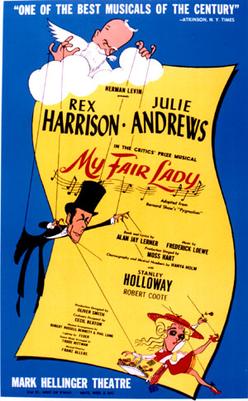
My Fair Lady is a musical with a book and lyrics by Alan Jay Lerner and music by Frederick Loewe. The story, based on the 1938 film adaptation of George Bernard Shaw's 1913 play Pygmalion, concerns Eliza Doolittle, a Cockney flower girl who takes speech lessons from professor Henry Higgins, a phonetician, so that she may pass as a lady. Despite his cynical nature and difficulty understanding women, Higgins grows attached to her.

Vivien Leigh, styled as Lady Olivier after 1947, was a British actress. She won the Academy Award for Best Actress twice, for her performances as Scarlett O'Hara in Gone with the Wind (1939) and Blanche DuBois in the film version of A Streetcar Named Desire (1951), a role she had also played on stage in London's West End in 1949. She also won a Tony Award for her work in the Broadway musical version of Tovarich (1963). Although her career had periods of inactivity, in 1999 the American Film Institute ranked Leigh as the 16th-greatest female movie star of classic Hollywood cinema.

Charles Laughton was a British-American actor. He was trained in London at the Royal Academy of Dramatic Art and first appeared professionally on the stage in 1926. In 1927, he was cast in a play with his future wife Elsa Lanchester, with whom he lived and worked until his death.

Sir Reginald Carey "Rex" Harrison was an English actor. Harrison began his career on the stage in 1924. He made his West End debut in 1936 appearing in the Terence Rattigan play French Without Tears, in what was his breakthrough role. He won his first Tony Award for Best Actor in a Play for his performance as Henry VIII in the Broadway play Anne of the Thousand Days in 1949. He returned to Broadway portraying Professor Henry Higgins in My Fair Lady (1956) where he won the Tony Award for Best Actor in a Musical.

Elsa Sullivan Lanchester was a British actress with a long career in theatre, film and television.
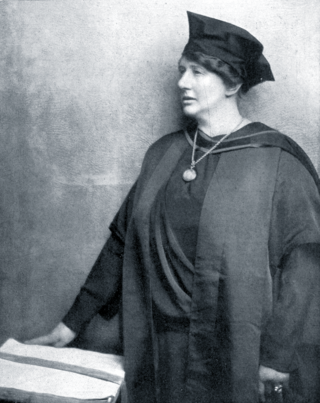
Lilian Mary Baylis CH was an English theatrical producer and manager. She managed the Old Vic and Sadler's Wells theatres in London and ran an opera company, which became the English National Opera (ENO); a theatre company, which evolved into the English National Theatre; and a ballet company, which eventually became The Royal Ballet.

Nora Noel Jill Bennett was a British actress.
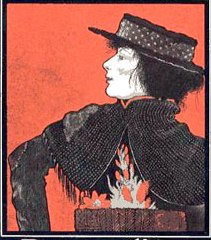
Pygmalion is a play by Irish playwright George Bernard Shaw, named after the Greek mythological figure. It premiered at the Hofburg Theatre in Vienna on 16 October 1913 and was first presented on stage in German. Its English-language premiere took place at His Majesty's Theatre in London's West End in April 1914 and starred Herbert Beerbohm Tree as phonetics professor Henry Higgins and Mrs Patrick Campbell as Cockney flower-girl Eliza Doolittle.
The Green Eye of the Yellow God, a 1911 poem by J. Milton Hayes, is a famous example of the genre of "dramatic monologue", a music hall staple in the early twentieth century. The piece was written for and performed by actor and monologist Bransby Williams. It has often been misattributed to Rudyard Kipling, who classed its author as being among his many imitators, and often parodied, most famously by Billy Bennett as The Green Tie on the Little Yellow Dog.
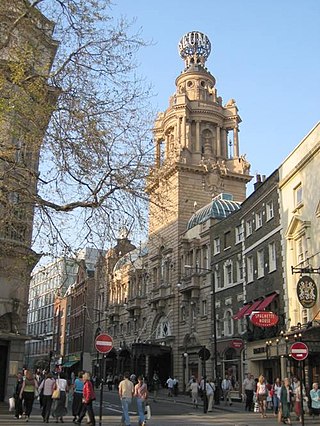
St Martin's Lane is a street in the City of Westminster, which runs from the church of St Martin-in-the-Fields, after which it is named, near Trafalgar Square northwards to Long Acre. At its northern end, it becomes Monmouth Street. St Martin's Lane and Monmouth Street together form the B404.

A Streetcar Named Desire is a 1951 American Southern Gothic drama film adapted from Tennessee Williams's Pulitzer Prize-winning play of the same name. It is directed by Elia Kazan, and stars Vivien Leigh, Marlon Brando, Kim Hunter, and Karl Malden. The film tells the story of a Mississippi Southern belle, Blanche DuBois, who, after encountering a series of personal losses, seeks refuge with her sister and brother-in-law in a dilapidated New Orleans apartment building. The original Broadway production and cast was converted to film, albeit with several changes and sanitizations related to censorship.

Patrick Ewart Garland was a British director, writer and actor.

A Yank at Oxford is a 1938 comedy-drama film directed by Jack Conway and starring Robert Taylor, Lionel Barrymore, Maureen O'Sullivan, Vivien Leigh and Edmund Gwenn. The screenplay was written by John Monk Saunders and Leon Gordon. The film was produced by MGM-British at Denham Studios.
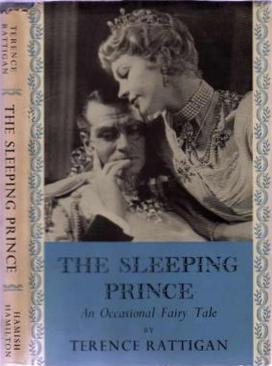
The Sleeping Prince: An Occasional Fairy Tale is a 1953 play by Terence Rattigan, conceived to coincide with the coronation of Elizabeth II in the same year. Set in London in 1911, it tells the story of Mary Morgan, a young actress, who meets and ultimately captivates Prince Charles of Carpathia, considered to be inspired by Carol II of Romania.

Busker Alley is a musical with music and lyrics by the Sherman Brothers and a book by AJ Carothers, based on the 1938 British film St. Martin's Lane.

Aunt Clara is a 1954 British comedy film starring Margaret Rutherford as a woman who inherits a number of shady businesses from a relative. Ronald Shiner, A. E. Matthews, and Fay Compton are also featured. The film was based on the 1952 novel of the same name by author Noel Streatfeild, and directed by Anthony Kimmins for London Films. It was shot at Shepperton Studios near London. The film's sets were designed by the art director Paul Sheriff.

Ronald Alfred Shiner was a British stand-up comedian and comedy actor whose career encompassed film, West End theatre and music hall.
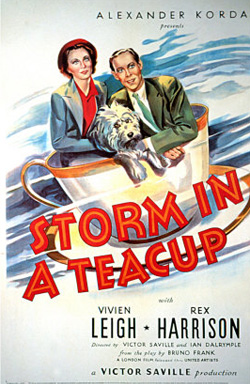
Storm in a Teacup is a 1937 British romantic comedy film directed by Ian Dalrymple and Victor Saville and starring Vivien Leigh, Rex Harrison, Cecil Parker, and Sara Allgood. It is based on the German play Sturm im Wasserglas by Bruno Frank, as well as the English-language adaptations: London's Storm in a Teacup and Broadway's Storm Over Patsy, both written by James Bridie. A reporter writes an article that embarrasses a politician. Meanwhile, the newspaperman is also attracted to his target's daughter.
Classical acting is a traditional type of acting which is centered around the external behavior of the performer. Classical acting differs from newer styles of acting, as it is developed around the ideas of the actor themselves which includes their expression of the body, voice, imagination, personalizing, improvisation, external stimuli, and script analysis. This further places emphasis on an actor's psychological relationship with their part as they 'live' their role in order to create realism.
Mayflower Productions was a British-based film production company of the 1930s and 1950s.

















